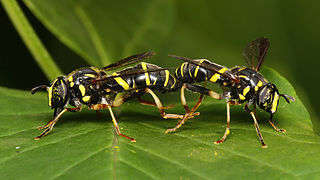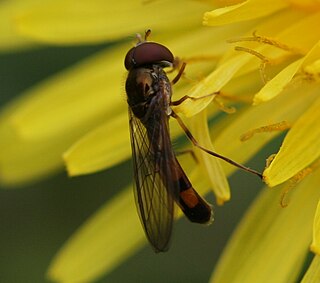
Hoverflies, also called flower flies or syrphids, make up the insect family Syrphidae. As their common name suggests, they are often seen hovering or nectaring at flowers; the adults of many species feed mainly on nectar and pollen, while the larvae (maggots) eat a wide range of foods. In some species, the larvae are saprotrophs, eating decaying plant and animal matter in the soil or in ponds and streams. In other species, the larvae are insectivores and prey on aphids, thrips, and other plant-sucking insects.

Episyrphus balteatus, sometimes called the marmalade hoverfly, is a relatively small hoverfly (9–12 mm) of the Syrphidae family, widespread throughout the Palaearctic region, which covers Europe, North Asia, and North Africa. It is considered the most abundant native hoverfly in Central Europe.

Eristalinae are one of the four subfamilies of the fly family Syrphidae, or hoverflies. A well-known species included in this subfamily is the dronefly, Eristalis tenax.

Eristalinus is a genus of hoverfly. Most species have very distinctive eye marking in the form of spots or banding, though these features may fade on some preserved specimens. Most are stout flies, and are nimble flyers, even compared to other hoverfly species.

Spilomyia is a genus of hoverflies. Many species in the genus show Batesian mimicry of wasp models, including black and yellow patterns and modified antenna shape.

Platycheirus clypeatus is a species of hoverfly. It is found across the Palearctic and in the Nearctic. The larvae feed on aphids. Adults are usually found on the edges of woodland or scrub, heath or along hedgerows where they visit a wide range of flowers.

Eupeodes luniger is a common species of hoverfly.

Eumerus is a genus of hoverflies, within the tribe Eumerini.

Temnostoma is a genus of hoverflies. The larvae of some species feed on the wood of deciduous trees.

Parasyrphus is a genus of hover fly found in the holarctic area of the world including species like Parasyrphus tarsatus located in some very northern areas. Very few of the 31 identified species have known larvae. Of the known larvae most are predators of tree aphids with one, Parasyrphus nigritarsis, that feed on beetle eggs and larvae.

Sphaerophoria is a genus of hoverflies. Species slender 5.6-12mm long with extremely large hemispherical male terminalia after which the common name globetail has been created. There are bright yellow markings on head and thorax and usually on the abdomen but some species have a black abdomen. They can be found worldwide but are common in North America, Europe, Asia and Australia. There are over 73 described species.

Melanostoma scalare, the chequered hoverfly, is a very common species of hoverfly.

Melanostoma mellinum is a very common species of hoverfly found in many parts of Britain, Europe including the Mediterranean basin and North Africa, the East Palearctic, and North America.

Baccha elongata is a species of hoverfly in the genus Baccha.

Caliprobola is a genus of Hoverflies, from the family Syrphidae, in the order Diptera.

Pipizini is a tribe of small to medium-sized generally black hoverflies, although some species also have orange spots on their abdomen. This nondescript colouring can lead to some species being confused with other dark hoverflies from other tribes. The lack of a facial knob is a good defining feature which separates them from most of these other hoverflies. As with other species in the subfamily Syrphinae the larvae feed on aphids though there seems to be a preference for wax-secreting aphids e.g. Pemphigidae.
Spilomyia annulata is a species of Hoverfly in the family Syrphidae.
Spilomyia maxima is a species of Hoverfly in the family Syrphidae.
Spilomyia sulphurea is a species of Hoverfly in the family Syrphidae.
Sphegina spheginea is a species of hoverfly in the family Syrphidae.















